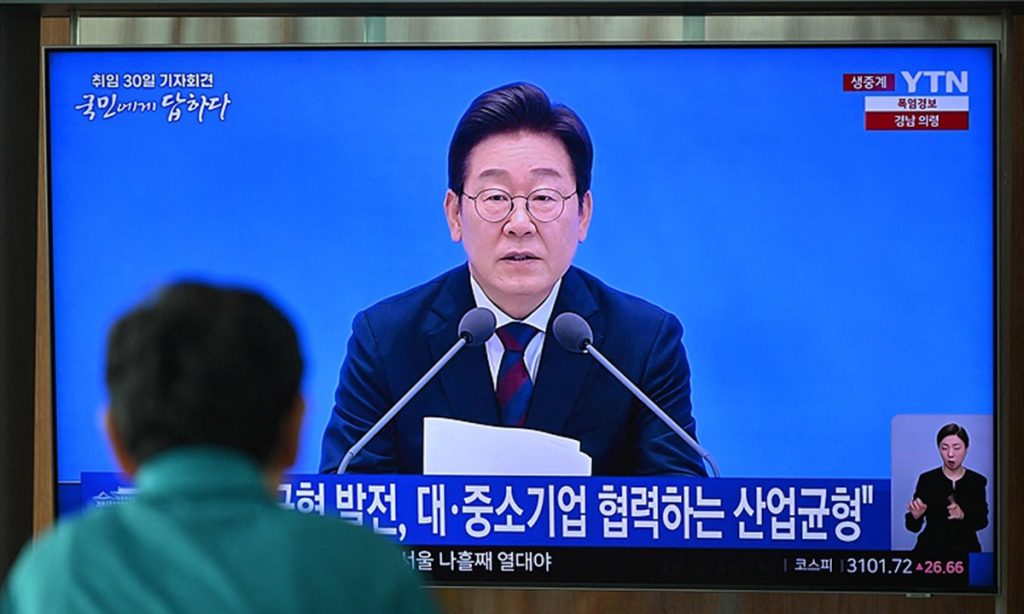South Korean President pledges early improvement of relations with China; China ties crucial for Seoul amid trade uncertainties: expert

South Korean President Lee Jae-myung, speaking on Thursday in a press conference after taking office last month, vowed to "protect peace and people's lives through practical diplomacy centered on national interests," based on South Korea's alliance with the US, close cooperation with South Korea, the US and Japan and the early improvement of its relations with China and Russia, according to the full text of Lee's speech published by the Maeil Business Newspaper on Thursday.
Improving ties with China under the Lee administration is a necessary matter, and it is crucial for Seoul to sustain economic growth amid uncertainties in trade talks with the US, according to analysts from China and South Korea reached by the Global Times.
According to South Korea's Yonhap News Agency on Thursday, at the press conference held at the former presidential compound of Cheong Wa Dae, known as the Blue House in Seoul, Lee elaborated on his foreign policy.
The Straits Times report noted that Lee pledged a pragmatic approach as the basis for accelerating efforts to improve ties with China and Russia, while saying the alliance with the US was the cornerstone of his foreign policy.
On Japan, Lee pledged to pursue a two-track approach in which past history issues, rooted in Japan's 1910-45 colonial rule of Korea, should be dealt with separately from future cooperation in security and economic areas, Yonhap reported.
Lee's latest statement reflects the consistency and stability of his long-advocated pragmatic foreign policy, which has been welcomed by the South Korean public as the rising approval ratings showed, Dong Xiangrong, a senior research fellow at the National Institute of International Strategy, Chinese Academy of Social Sciences, told the Global Times on Thursday.
In a recent Gallup Korea survey, 64 percent of 1,004 adult respondents said Lee was doing a good job, Yonhap reported on June 27, about three weeks into his term in office.
Another survey by Realmeter and commissioned by a local news outlet showed on Monday that Lee's approval rating rose for the second consecutive week to 59.7 percent, the Korea Herald reported.
On Thursday, Lee also reiterated his pledge to revive the country's faltering economy and outlined plans to boost growth. However, Lee said that the uncertainty remains for Seoul if its trade talks with Washington can result in a deal before next week's deadline to avert sweeping US tariffs, according to the Bloomberg.
Lee vowed to make his best efforts to produce "mutually beneficial and sustainable outcomes" in the trade negotiations, according to Yonhap.
Lee's economic policies and diplomatic strategies are closely linked. He is committed to improving relations with China while facing obstacles in tariff negotiations with the US, which are closely tied to South Korea's current economic difficulties, Dong said.
According to a May assessment by the Bank of Korea, the central bank of the country, economic growth this year is projected to be only 0.8 percent.
After Lee took office, South Korea's stock market has witnessed significant rise, but such growth is largely interpreted as a boost in market confidence driven by recovering political stability and the elimination of uncertainty, rather than a substantial improvement in economic fundamentals, Dong said. "To achieve sustained economic improvement, tangible progress is still needed in areas such as domestic investment, consumption, and foreign trade."
Improving relations with China is also one of the key and feasible directions of Lee's economic policy, aimed at promoting South Korea's economic recovery through strengthened international trade cooperation, Dong explained.
Woo Su-keun, head of the Institute of East Asian Studies of Korea and president of the Korea-China Global Association, told the Global Times in a recent interview that improving South Korea-China relations under the Lee administration is a necessary matter.
In fact, South Koreans with sound and reasonable judgment are well aware of the importance of South Korea-China relations, regardless of their political orientation, whether they are conservative or liberal, as well as the need for improved South Korea-China relations, Woo said.
Currently, the global economic environment is being distorted by the excessive greed of certain countries. However, South Korea and China, the central core countries of the global society, need to work closely together to maintain the banner of free trade and fair competition, which are essential for the sustainable shared prosperity of the global community, Woo urged.